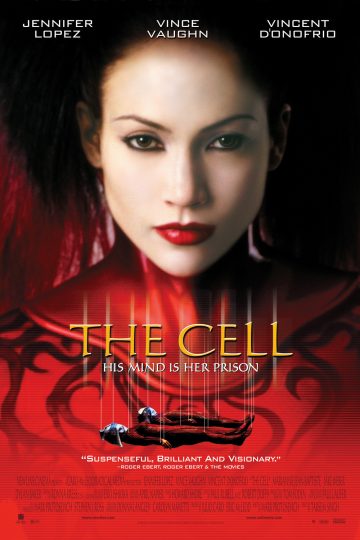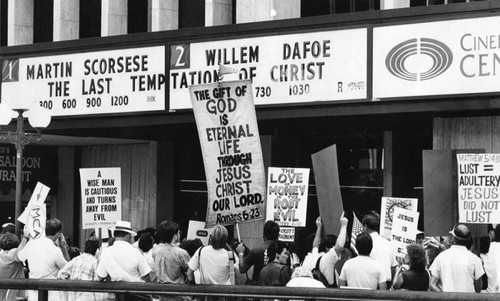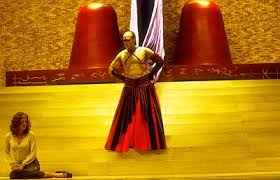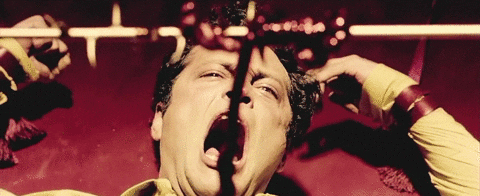In 1997 DMA Design released GRAND THEFT AUTO, the first installment of what would become a phenomenally popular video game series, in a none-too-unique fashion: by playing up the controversy surrounding it. In a campaign masterminded by the notorious British publicist/sex offender Max Clifford (1967-2010), critics were paid to post negative reviews, with right wing news outlets given special exposure. Long story short: it worked.
 This tidbit puts me in mind of New Line Cinema’s now 20 year-old THE CELL. Why? Because negative exposure was utilized in its promotion just as assiduously as it was with that of GRAND THEFT AUTO—indeed perhaps even more so.
This tidbit puts me in mind of New Line Cinema’s now 20 year-old THE CELL. Why? Because negative exposure was utilized in its promotion just as assiduously as it was with that of GRAND THEFT AUTO—indeed perhaps even more so.
This is nothing new, and certainly wasn’t back in 2000. The previous decade had played host to a flurry of controversial films, spearheaded by Miramax and its main player Harvey Weinstein. Not unlike fellow jailbird Max Clifford, Weinstein was known for “controversial” releases that in the nineties included THE COOK, THE THIEF, HIS WIFE AND HER LOVER (which Weinstein apparently decided to acquire during a festival screening in which he noticed patrons walking out in mass), TIE ME UP, TIE ME DOWN and KIDS, all of which garnered a great deal of ire that Weinstein made sure to amplify.
Contrary to what has been claimed, THE CELL has not entirely “become lost to history,” but the furor that accompanied its release does appear to have slipped peoples’ minds. Back in 2000, though, that furor was impossible to ignore, and (unlike the abovementioned films) THE CELL inspired it entirely on its own, i.e. without any help from its studio’s publicity department—although New Line certainly wasn’t averse to playing up the outrage.
The reviews were downright venomous. The Los Angeles Times’ Kenneth Turan proclaimed “Some movies make you sorry you’ve seen them, and THE CELL is one of those. Creepy and horrific, it’s a torture chamber film about a man who tortures women that puts viewers through as much misery as the people on the screen.” Internet critics weren’t much more enthusiastic (keep in mind that print and online criticism were far more polarized back in 2000 than they are now), with Aint-It-Cool-News’s Moriarty, a.k.a. Drew McWeeney, dismissing it as a “festering bag of vomit” and opining that its debuting director Tarsem (a.k.a. Tarsem Singh) “works under the one name because he’s afraid if he gives his last name out, someone who sat through this abortion might look him up in the phone book, drive to his house, and stomp him like a narc at a biker rally. He certainly deserves it” (and this at a time when, unlike today, moralistic outrage was considered deeply uncool).
Of course you can’t have a true controversy without some dissenting voices, which in this case were provided by Roger Ebert and his TV partner Richard Roeper. Specifically, Ebert proclaimed THE CELL one of the best films of 2000, and Roeper dubbed it a “masterpiece.” Ebert, let’s not forget, was one of the few mainstream critics who back in 1969 praised THE WILD BUNCH, even as seemingly all his colleagues were trashing it. The fact that, in his praise of THE CELL, Ebert’s was once again a lone voice in the movie wilderness was certainly an encouraging (if ultimately misleading) sign.
It was around then that I mentioned to a friend I was planning on checking out THE CELL. His impassioned response: “Don’t see that!” The controversy, it seemed, had spread from the critical sphere to the real world, in a furor whose likes hadn’t been seen (by me at least) since the 1988 release of THE LAST TEMPTATION OF CHRIST.
The latter, for those who don’t know, was the most controversial film of the latter half of the Twentieth Century. Indeed, it ranks  among the most controversial films of all time, beaten only by the early Twentieth Century provocations THE BIRTH OF A NATION (1915) and ECSTASY (EXTASE; 1933), both of which inspired a level of ire that would be unimaginable today.
among the most controversial films of all time, beaten only by the early Twentieth Century provocations THE BIRTH OF A NATION (1915) and ECSTASY (EXTASE; 1933), both of which inspired a level of ire that would be unimaginable today.
THE LAST TEMPTATION OF CHRIST was a Martin Scorsese helmed adaptation of Nikos Kazantzakis’s 1955 novel that depicted Jesus Christ (Willem Dafoe) engaged in decidedly un-Christ-like activities. It incurred the wrath of Christians the world over, and resulted in mass threats and demonstrations against Scorsese and the film’s distributor Universal. I know I’ll always remember seeing THE LAST TEMPTATION OF CHRIST on its opening day in Century City. I vividly recall helicopters circling overhead, people shouting at me from the sidelines and TV news crews frantically rushing around to capture it all (as well as a couple people ahead of me in line who were there to see MIDNIGHT RUN, and seemed mighty puzzled by all the furor). It remains the single greatest moviegoing experience of my life, with my sole regret being that I didn’t stick around after the movie was over; this, after all, was most definitely where the action was on August 12, 1988!
That action, alas, dissipated rather quickly once THE LAST TEMPTATION OF CHRIST was unveiled. Quality-wise it was about what you’d expect given that its director isn’t exactly known for making biblical epics and its post-production was admittedly truncated (so Universal could get the pic out as quickly as possible). Hence, in the following weeks the outrage died down and the film’s theatrical run quietly fizzled out.
 THE CELL’s notoriety had a similar drop-off upon being exposed to the public. The major differences, of course, were that 1). Universal seemed put off by all the controversy surrounding THE LAST TEMPTATION OF CHRIST while New Line positively relished the furor generated by THE CELL, and 2). the latter film’s August 18, 2000 opening day screening, which I once again attended (this time at a So Cal multiplex), was decidedly less fraught than that of the former film, with no protestors, helicopters or news crews to be found. Nonetheless, there was an excitement to THE CELL’s opening that I really haven’t experienced since. Given all the outrage, it felt like seeing this film was a genuinely Subversive Act.
THE CELL’s notoriety had a similar drop-off upon being exposed to the public. The major differences, of course, were that 1). Universal seemed put off by all the controversy surrounding THE LAST TEMPTATION OF CHRIST while New Line positively relished the furor generated by THE CELL, and 2). the latter film’s August 18, 2000 opening day screening, which I once again attended (this time at a So Cal multiplex), was decidedly less fraught than that of the former film, with no protestors, helicopters or news crews to be found. Nonetheless, there was an excitement to THE CELL’s opening that I really haven’t experienced since. Given all the outrage, it felt like seeing this film was a genuinely Subversive Act.
Subversive, however, is not how I’d describe the content of THE CELL. Nor would I deem it particularly good. A hard-R rated horror movie about a sexy psychotherapist (Jennifer Lopez) entering the mind of a serial killer (Vincent D’Onofrio) through virtual reality, it’s essentially SEVEN meets THE MATRIX, filtered through a very nineties music video aesthetic. The film is never as weird or as shocking as it wants to be, although it certainly tries its damndest in that latter regard, with scenes of D’Onofrio masturbating while suspended from hooks stuck in his back and co-star Vince Vaughn getting his small intestine wound onto a spiked stick.
It certainly doesn’t help matters that THE CELL’s narrative is half-baked at best. J-Lo is said to have saved the film’s script, credited  to Mark Protosevich (of I AM LEGEND and OLDBOY), from development hell and personally shepherded it into production, yet it’s a shockingly flimsy and perfunctory piece of work whose emphasis is on glitzy visuals (including some gratuitous footage of J-Lo’s famous butt).
to Mark Protosevich (of I AM LEGEND and OLDBOY), from development hell and personally shepherded it into production, yet it’s a shockingly flimsy and perfunctory piece of work whose emphasis is on glitzy visuals (including some gratuitous footage of J-Lo’s famous butt).
On his DVD audio commentary Tarsem admits the film isn’t as “smart” as it could have been (with David Cronenberg’s eXistenZ singled as the type of intelligent film Tarsem would have liked to have made), and he’s since claimed that he directed it solely to gain exposure for his subsequent feature THE FALL (2006). That film, for the record, is far superior to THE CELL, being more conceptually daring and less eager to shock; perhaps we shouldn’t be surprised that it received a fraction of THE CELL’s popularity.
The lesson here is that, simply, controversy sells. This might seem difficult to believe nowadays, when media companies tend to shrink from negative reaction of any sort, but it remains a fact. Controversy arguably helped THE CELL gain the level of success it achieved (netting $104,155,843 against a $33 million budget), just as it did with GRAND THEFT AUTO and THE LAST TEMPTATION OF CHRIST, and now that the controversy has dissipated the film is fully revealed as the limp noodle it always was.
